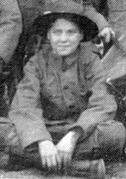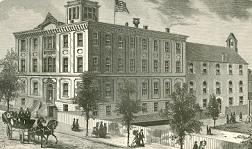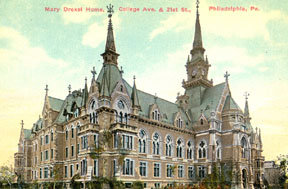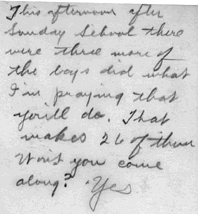
|
Keep Sweet! |
|
A Memoir by the Late Dr. Roy Sheppard Minerd - Part 10 of 12 |
Last month: With "calibre and manhood," and the help of their mentor Roy S. Minerd, orphan boys Jim and Arthur, of Philadelphia's Northern Home for Friendless Children, overcome their own private burdens. One boy rises above a harsh upbringing in a bad section of Philadelphia, and another works through the anger of being in an abusive job, to both build self-esteem and become more productive members of society. Tragically, another promising boy, Bill Edwards, whose life had been turned around, becomes ill and slips quietly into that long good night.
|
|
|
The Northern Home building |
Dec. 6, 1916
On Sunday, Oct. 29, I was asked to take Chapel and as it was Visitors' Day,
and the first day visitors had been admitted since the quarantine in July, I
knew there would be a large gathering of parents and friends of the children. My
central thought was the difference between the life of the Christian and the
non-Christian here, and the results in the after life. My lessons were the story
of the Rich Man and Lazarus, and the description of Heaven as given by John in
Revelation. I rarely bring out the "Fire and Brimstone" side of
religion, but I did that morning. So many of those parents need it. A gospel of
love doesn't affect them at all. I wound up with 15 reasons why I believe there
is a Hell -- not necessarily a fire and brimstone place, but a place of
punishment where those who refuse to accept Christ and by doing so antagonize
His cause, will be punished.
 |
|
Frank Kichlein |
At the close of the service, Frank Kichlein, as I was passing the Reception Room, ran out and taking me by the arm drew me into the room with "This is my father, Mr. Minerd," at which Mr. K. showed he had been hit by the talk by telling me how good a fellow he was.
"I was just telling Frank," he said, "That I don't swear, nor drink nor use tobacco, and I want him to grow up to be as good a man."
"That's all fine," I replied. "Add a thorough Christian experience to that and you'll be a man."
That afternoon at Sunday School, Frank came up with a shining face and said, "Well, we must do things step by step. My father promised me he would read a chapter in the bible every day." Later he told me that his father was either about to buy his bible, or had bought one; I am not sure which.
As I was going up to Chapel, I passed a man with two little girls, on the stairs. I spoke and after I passed, I heard one in a stage-whisper say, "That's him; he all the time tells us to 'Keep Sweet'."
If they don't remember anything else I've been trying to teach them, I hope they will remember that motto and song.
 |
|
Gardner |
Early in the summer, while a squad of us were talking over the adoption of several of the boys, and what nice homes they had found, Gardner, our old stand by, stood by silent. Presently in such a longing, pathetic tone of voice he said, "Someday maybe I'll have a home like that."
It was so full of loneliness and longing! Miss Sexton immediately replied, "Yes, Gardner, you will," and before even she expected it, the time came. When I went up to Chapel the morning in question, and missed Herbert, they told me he had been placed out on a beautiful big farm not far from the city with a very fine family and that they and he were perfectly delighted over the arrangement. Since that time his mother has visited him and is very much pleased with his home.
The Schofield boys [described earlier] were taken by their mother and Dawson was given a position with board and room near the Home, so the boys have for some time been deprived of the influence of these sturdy chaps.
I also found out on my morning visit in October, that Bill Edwards was in the infirmary, a very sick boy. Bill, it will be recalled, was the chap who told me about the escapades of the boys before the arrival of Miss Sexton. He is the one whom I took to the slums and showed the contrast between conditions there and at the Home, and be it was who helped me create sentiment against that sort of action among the Home boys.
|
|
|
The Drexel Home at College Avenue and 21st Street |
I wanted to see him, but they weren't sure of their diagnosis, and I didn't go over. By the next Wednesday he became so much worse that he was taken to the Mary Drexel [Home] where I went twice to see him, and found him very ill indeed.
On my second visit I saw his doctor and had a long talk with him about Bill's trouble. It was of a nature that was little understood and almost baffled them. Little hope was given for his recovery, and at 3 p.m. Sunday, Dec. 3, as the remainder of his Sunday School class were studying Rev. 3, "Behold, I come quickly," his spirit was freed from the frail, wasted, little body and Bill slipped from the arms of his heart broken little mother, to nestle his weary head on the bosom of the one whom Bill had learned to know but a few months before.
Both times I saw him I mentioned to him something about his having been willing to accept Christ into his life and at such times his face, drawn with pain, would light up and he seemed to want to talk about it.
"I think a lot while I am lying here alone," he said once, "and I am so glad I became a Christian when I did. It helps me now."
And in that faith, strengthened and encouraged, Bill, just as his outlook in life began to broaden, just as he had learned to love and trust his Big Brother and his Heavenly Father, received his summons -- his work here was ended and he was taken up higher where pain and suffering and poverty and deprivation and sorrow are no more.
His mother, a brave frail little woman deserted by a heathenish husband, left to provide for the three boys and three girls of whom Bill, 12 years old, was the eldest, has made a brave struggle, and now is prostrated over the loss of the oldest and best of her boys.
Wednesday at 11 a.m. (Dec. 6) we will lay him away and boys from the Home are appointed as pall bearers.
| 'I cannot describe my feelings as I write. I trust I may be pardoned for such a statement, but I tremble with a keener sense of responsibility as I think of Bill's being called away if he had been unprepared.' |
I cannot describe my feelings as I write. I trust I may be pardoned for such a statement, but I tremble with a keener sense of responsibility as I think of Bill's being called away if he had been unprepared. On the other hand, I can scarce restrain tears of joy when I think that my feeble efforts in the hands of the Master were used in bringing Bill to Christ -- the Christ who was his comfort in sickness and his triumph in death. On, what a blessing to one's own self is it to lead one to know the joys of Christ in one's own life! And then what a joy it will be some day, when time has ceased and the dead are raised and we are all summoned before the Great White Throne to hear our little homeless Bill say,
"Yes, I am here, washed in the Blood of the Lamb, because he brought me to Christ and influenced me to become a Christian." Does it pay? Do we, any of us, feel keenly enough the responsibility resting upon us individually for the safety and salvation of "the least of these?"
Bill's death cast a shadow of gloom over the Home to day when the boys were told of it, and many a boy is more sober and thoughtful than he has been for many a day. And I am praying that Bill in his death may be the means of bringing others to the feet of the Christ.
About the middle of November, Charley Saylor came to me during Sunday School and said his brother Roy wanted to see me after the session. I knew what he wanted and told Charley to bring along any others who were interested. He said they had been talking it over with Patterson and Valco and they wanted to come. It was the first opportunity I had had since Charley mentioned it to me before, so after Sunday School we five with several others who were straight on the proposition had a most delightful little get-together in one of the class rooms, and those three -- Roy Saylor, Patterson and Valco added their names to the list of those who are determined to live for Christ.
Several times since, when talking to someone after the service, I have felt a grip on my arm or a hand slipped into mind, and turning, have seen one of the three who wanted to tell me of his failures and triumphs in his week's experiences.
|
|
|
Note signed by Price,
indicating his |
That evening, Rev. Dr. Smythe gave his famous lecture-sermon on "Turning Points in Life." Price, one of the older boys who has left the Home recently to go home to his mother, sat beside me. Price was away from the Home all summer or he would have been in the ranks among the first. I had never had a chance to say much to him, but this Providentially provided opportunity was not to be thrown away, so the first note below was slipped over to him.
"He is speaking of turning points. What is the matter with your making this evening a turning point and you become a Christian boy?"
No response. Later the second.
"Work for you to do. That's why I want you to get in line."
Still no response, but sober careful study. Then the third.
"This afternoon after Sunday School there were three more of the boys did what I'm praying that you'll do. That makes 26 of them. Won't you come along?"
After reading it over twice he reached for my pencil and wrote the "Yes" that gave me a thrill of joy. At the close of the service he went with me to meet Dr. Smythe and made known to him his decision.
There was no chance to talk to him that evening and the next Sunday I was detained by sickness so that two weeks slipped by before I could explain things to him. When I did have a chance I met with a cool indifference which I have not yet fathomed or overcome. The pastor spoke to him about uniting with the church but got very vague answers. I told him we were still praying for him and I am trusting that Bill's death will help win him over.
Next month: Some of the boys flourish and develop beyond what they had ever imagined, including singing solos in chapel services, joining church with their parents and continuing to follow the 'keep sweet' mindset. Others, however, remain plagued by their personal demons, and do not maintain their progress.
Copyright © 2002 Mark A. Miner


